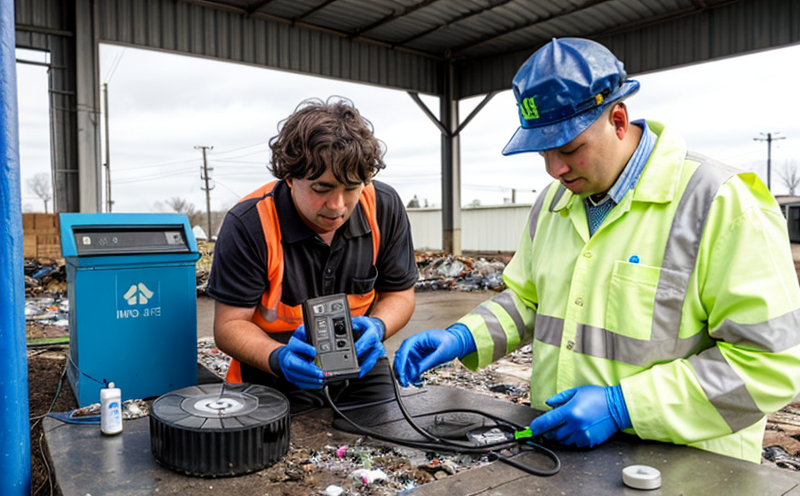EPA SW-846 Method 3050 Acid Digestion of E-Waste Samples
The EPA SW-846 method 3050 is a cornerstone for the analysis and characterization of electronic waste (e-waste) samples. This procedure, which involves acid digestion followed by either solvent extraction or direct microwave digestion to dissolve the solid matrix, enables the accurate quantification of metals present in e-waste materials.
Acid digestion is particularly crucial as it breaks down complex organic matrices and releases metal ions into a solution that can be analyzed further. This method ensures that all metals within the sample are available for measurement, providing reliable and reproducible results. The choice between solvent extraction and microwave digestion depends on the specific requirements of the analysis.
The process begins with thorough sampling and preparation of e-waste materials. Proper specimen preparation is critical to ensure accurate representation of the material's metal content. This includes ensuring that all components are homogenized, which can be challenging given the diverse nature of electronic waste. The digestion process then proceeds using concentrated acids such as nitric acid or hydrochloric acid.
Once digested, the solution is filtered and analyzed using various analytical techniques, including but not limited to inductively coupled plasma mass spectrometry (ICP-MS) for trace metal analysis. This method allows for precise quantification of metals down to parts per billion levels, ensuring that even the smallest amounts can be detected.
The importance of this method cannot be overstated, especially given the increasing regulatory scrutiny on e-waste management and recycling. Accurate and reliable data obtained through SW-846 3050 ensures compliance with international standards such as ISO 17025 and helps in meeting environmental protection requirements.
Furthermore, this method plays a vital role in research and development efforts aimed at improving the efficiency of e-waste recycling processes. By understanding the metal content within different types of e-waste, manufacturers can optimize their processes to recover valuable materials more effectively. This not only reduces waste but also minimizes environmental impact.
The acid digestion process is just one part of a comprehensive approach to e-waste analysis and management. Other related methods include the incineration of plastics for energy recovery and leaching tests to assess the mobility of metals in landfills or during recycling processes. Together, these techniques provide a holistic view of how e-waste can be managed sustainably.
Understanding the complexities involved in sample preparation and digestion is key to interpreting accurate results. Factors such as the type of acid used, reaction time, temperature control, and the presence of interfering compounds all play significant roles in ensuring reliable outcomes. Properly executed, this method provides critical insights into the composition of e-waste, aiding decision-making processes across various sectors.
To summarize, EPA SW-846 Method 3050 Acid Digestion of E-Waste Samples is an essential tool for those involved in waste management and recycling testing. Its ability to accurately quantify metals within complex samples makes it indispensable for ensuring compliance with environmental regulations while supporting research aimed at improving e-waste recovery practices.
Why It Matters
Ensuring accurate analysis of electronic waste is critical not only from an environmental perspective but also for regulatory compliance and sustainable development. Accurate quantification of metals in e-waste is essential to understand the composition of these materials, which can then inform decisions about how best to manage them.
- Environmental Impact: Proper analysis helps identify potential pollutants that could leach into soil or water during improper disposal methods.
- Regulatory Compliance: Meeting standards set by organizations like the EPA ensures that waste management practices are legal and safe.
- Sustainable Development: Understanding metal content can guide efforts to recycle valuable resources from e-waste, reducing reliance on virgin materials.
The acid digestion process described in SW-846 Method 3050 is particularly important because it ensures all metals within the sample are available for measurement. This comprehensive approach allows stakeholders to make informed decisions about waste treatment and recycling processes.
In addition, accurate analysis helps identify hazardous substances that may pose risks if not properly handled. By adhering to stringent testing protocols like SW-846 3050, organizations can ensure they are not only compliant with current regulations but also contributing positively to future environmental standards.
Eurolab Advantages
At Eurolab, we pride ourselves on delivering high-quality, reliable testing services that meet the stringent requirements of regulatory bodies like the EPA. Our expertise in this area is complemented by state-of-the-art facilities equipped with advanced instrumentation capable of handling complex e-waste samples.
- Comprehensive Expertise: Our team comprises seasoned professionals with extensive experience in waste management and recycling testing, ensuring that every sample receives expert attention.
- Accurate Results: Utilizing cutting-edge technology such as ICP-MS allows us to provide precise measurements of metal content down to parts per billion levels.
- Compliance Assurance: Our rigorous quality control measures ensure that all results meet or exceed the standards set by international organizations.
We understand the importance of accurate and reliable data in making informed decisions about waste management practices. By leveraging our extensive knowledge base and sophisticated equipment, we offer a comprehensive suite of services tailored to meet the specific needs of our clients.
Beyond just technical proficiency, Eurolab also emphasizes customer satisfaction through personalized service and timely delivery of reports. Whether you're seeking compliance verification or detailed analytical data, trust us to deliver results that exceed expectations.
Quality and Reliability Assurance
- Rigorous Quality Control: Our laboratory operates under strict quality control measures to ensure consistent results.
- Regular Calibration: Instruments are regularly calibrated to maintain accuracy throughout the testing process.
- Trained Personnel: Our team comprises experts with extensive experience in waste management and recycling testing.
To further enhance reliability, we also participate in proficiency tests organized by recognized bodies. These external validations provide an additional layer of assurance that our methods are sound and consistent.
In conclusion, EPA SW-846 Method 3050 Acid Digestion of E-Waste Samples is a critical tool for ensuring accurate and reliable analysis of electronic waste samples. By adhering to this standard procedure, we contribute significantly towards sustainable practices in waste management and recycling.





